Education
Teachers Adapt to AI to Preserve Education
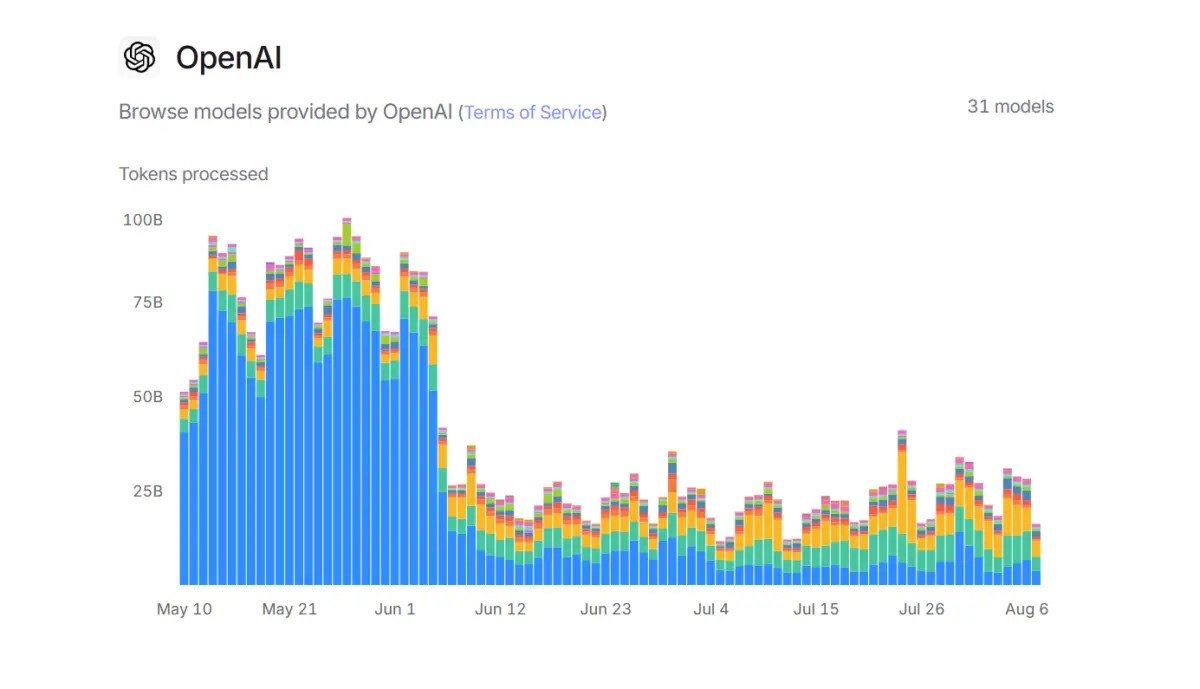
School is back in session, and educators are changing their methods to ensure students still learn as the tech becomes more ubiquitous in the classroom.
Since the release of ChatGPT, students have found it easier than ever to cut corners, but educators believe it can provide an indispensable tool.
John von Seggern, an educator and founder of the Futureproof Music School — an online school that teaches students electronic music production — told Cointelegraph that AI tutors can provide “true personalization at scale” with a one-on-one educational experience.
AI also allows students to “farm out” some of the more menial aspects associated with research to focus on the core task. Some educators say it allows students to pick up supplementary skill sets more quickly.
Educators change their methods and adapt to AI
AI’s bad reputation in education isn’t entirely unfounded. Reports in prominent technology media noted a precipitous drop-off in AI tokens at the end of the 2024 school year. In this case, the AI tokens, the small pieces of text processed by large language models and AI, were students using ChatGPT to complete their studies. Educators have also expressed exasperation at its presence in classrooms.
Von Seggern said that AI poses a number of challenges, with cheating being one.
For Daniel Myers, an associate professor of computer science at Rollins College, it’s not just about cheating. “The biggest challenge of AI is that it breaks the connection between the work that students submit and the learning behind that work,” he told Cointelegraph.
In the age of pen and paper, he said that if a student submitted a paper with correct citations, “you could reasonably assume that they had learned something about using citations properly. In the AI era, though, we can’t draw any conclusions about learning just by looking at submitted work.”
Myers added that, to learn something, there needs to be friction — i.e., “it needs to be difficult enough to give you an appropriate challenge.” So, even if students aren’t cheating, undisciplined AI use is taking away a valuable educational experience.
As educators become more familiar with AI technology and its potential to be used as a shortcut, they are developing methods and changing their approaches to ensure that students are actually doing the work and learning.
Von Seggern said at his institution, “Students hand in their entire projects so we can see their work. That is one way of addressing the cheating issue. We’re fine with students using AI in their workflows, but we need to see their process to best help them develop their skills.”
Related: Anthropic valuation triples to $183B as Claude AI gains traction in crypto and beyond
He said, “AI can be used as a shortcut, but our job (and the job of all educators today) is to design the learning process so it still requires real understanding.”
Myers said that professors and teachers need to “lean into designing and curating the educational experience,” including “thinking about the goals of a class and how they might be changing due to AI.”
AI has heavily impacted the computer science field. The technology is good enough at coding to “completely obliterate” past assignments Myers used in undergraduate courses.
To adjust, he’s moved much of the students’ former homework assignments into the classroom and lab time so “most of the students’ core programming practice is happening in person, with me there to observe and work with them.”
Now, out-of-class assignments are larger and more creative and come with guidance on how to use AI design. “When designing an assignment, I now think a lot about agency. Am I asking students to just answer a question, or am I challenging them to set a vision and choose to pursue it?” said Myers.
He said that if the educational process gives students agency and the ability to take ownership of their work in a process that supports them, “then they’ll be dissatisfied with low-quality AI generations.”
AI can “supercharge” learning — when used correctly
Even though AI has presented challenges for educators, it also presents opportunities. Myers said it can “supercharge” education when used correctly, allowing students to tap “a range of knowledge, skills and perspectives that would be difficult to obtain.”
He sees students “using AI effectively to take on big, ambitious projects with a personal creative element.”
“We often say that AI is ‘like having a minor in everything.’”
Von Seggern said that AI “offloads the tedious parts of music production so students can spend more time listening, making decisions and finishing work.”
He added that AI tutors — also when implemented correctly — can give students the attention and benefit of a one-on-one teacher-student relationship.
“An AI assistant can give every student a 24/7 personal learning coach that adapts to their background, goals and pace and nudges them at the right moment. It shortens the feedback loop from days to seconds, so students learn faster,” he said.
AI developers make models focused on education
AI developers are creating models for education as university administrators become increasingly interested in the possibilities the technology presents.
Anthropic created its Claude for Education on top of its core Claude model, but with specialized features for education. A spokesperson told Cointelegraph that its Learning Mode feature “focuses on developing critical thinking skills through guided exploration rather than providing direct answers.”
They said that “rather than simply solving a calculus problem for a student,” it walks it through the methodology and helps the student understand the concepts involved.
In July 2025, Anthropic founded a Higher Education Advisory Board chaired by Rick Levin, former Yale president and Coursera CEO, with members from Stanford, Michigan, University of Texas at Austin, Rice and Complete College America.
The spokesperson said, “This board ensures our development aligns with educational values and pedagogical best practices.”
The company has also partnered with universities to “help us understand and address implementation challenges in real educational settings.”
Still, even Anthropic noted the possibility for misuse and a lack of long-form engagement with education-focused AI models.
Referring to research from August, the spokesperson stated, “Our analysis found that nearly half (47%) of student-AI conversations involve direct answer-seeking with minimal engagement, raising concerns about potential misuse and overdependence on AI rather than developing critical thinking skills.”
Anthropic said that, as it continues to develop tools for students and teachers, it intends to “analyze usage patterns and share both positive findings and areas of concern.”
When it comes to education, AI is here to stay. Educators are coming up with novel ways not just to address the challenges of the technology but to improve their students’ education. The process will clearly have some growing pains, and it will require the participation of educators, developers and students to ensure an outcome that keeps education intact.
Magazine: ChatGPT’s links to murder, suicide and ‘accidental jailbreaks’: AI Eye
Education
What I wish I knew before going to university

 BBC
BBCOver the next couple of weeks, hundreds of thousands of new students will descend on universities around the country.
For many, this will mark the start of a brand new adventure – though one often filled with a lot of worry.
To help with nerves, BBC News asked for tips from 2024’s first-years, who’ve already sussed out being freshers.
From balancing studies and social life, to looking after your mental health and the importance of doing the washing up, this is what the class of 2024 have to say to the new kids on the block.
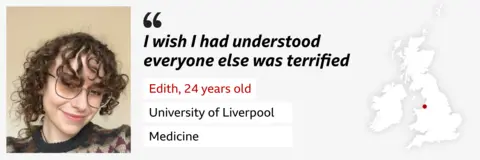
Edith Adam says she was “terrified” when she moved to Liverpool last year to study medicine.
What she hadn’t realised at the time was that other freshers were just as scared as she was.
“I was absolutely terrified about not being able to make friends or that people wouldn’t like me,” says Edith, who’s now going into her second year.
“I wish I had understood everyone else was terrified, and that they appreciate it when you go up to them and say hi.”
 Edith Adam
Edith AdamHaving never been to Liverpool before – a city with a party reputation – Edith worried she might not fit in.
“I was really scared of being ostracised for not wanting to go clubbing every night and not being a drinker,” she says.
But Edith was still able to find her people.
“No one actually cares. There are plenty of things you can do that don’t revolve around late nights. Just find what works for you.”
 Edith Adam
Edith AdamThe 24-year-old, from Huddersfield, says her advice would be not to put too much importance on the infamous freshers’ week.
“I think everyone goes in with the expectation that it’s this amazing, wild week, where you meet your best friends for life and have your best time at uni,” she says.
And her top tip for staying friends with your flatmates?
“If it takes less than two minutes, just do it,” Edith says. “It’s so easy for everything to pile up, and then you don’t wash your plates for five days, and all of a sudden everything is dirty and you have no cutlery – and your flatmates hate you.”

But what if you can’t make freshers week?
This is the situation Konstantin Schmidt faced last year, after issues with his visa delayed his start at Greenwich University by five weeks.
Although people told him the freshers parties he’d missed out on were “fun”, the mechanical engineering student says he still managed to settle in well by joining up to student clubs.
“Societies are the best way to find people who share the same passion,” Konstantin says.
 Konstantin Schmidt
Konstantin SchmidtJoining both a volleyball society and the Formula One society, he says he had positive interactions right from the off.
“The second I joined the room the members saw I was new and instantly included me,” Konstantin says. “I also met new people through volleyball who were on my course who quickly became my friends.”
 Konstantin Schmidt
Konstantin SchmidtThe 21-year-old bonded with his flatmates by exploring each other’s culture through food and music.
In his first weeks, Konstantin, who’s from Bavaria in Germany, made Spätzle – a pasta dish topped with grilled cheese for a dinner party with his flatmates.
“Everyone really liked” his food, he says – but he admits the best dish was a Filipino one made by his flatmate, Kai.
“It helped us understand everyone’s culture even better,” Konstantin says.
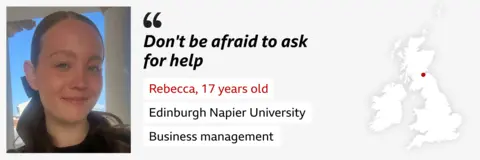
While many people starting university will be living away for the first time, some students still live at home.
Commuting more than an hour each way between Glasgow and Edinburgh, Rebecca can relate.
“If they forget something, my friends can just nip back to their accommodation, whereas I can’t, ” she says. “But it’s not bad, I like commuting in.”
Going into her second year of a business management course, Rebecca is now much more organised and comfortable with the journey, after experiencing some hiccups in her first year.
 Handout
HandoutIn some cases, cancelled trains meant she had to pay for a taxi all the way to Edinburgh.
“In second year I will definitely be checking my trains,” Rebecca says.
Her advice for freshers is simple: “Make sure your bag is fully packed with everything you might need – and plan your commute.”
Rebecca’s university experience has been different from many others as she was only 16 when she started her course.
“I thought everyone was going to be older and not want to speak to me,” she says. “But it wasn’t like that at all. The age gap doesn’t really matter.”
 Handout
HandoutNow 17, Rebecca is still waiting to experience a full freshers’ week, but says she was still able to attend under-18 events.
Her advice for those in a similar position?
“Don’t be afraid to ask for help,” she says. “I felt like I couldn’t ask for help because people would think I didn’t deserve to be there because I’m younger.
“They don’t care that you’re 16 or 17. Just ask for help.”
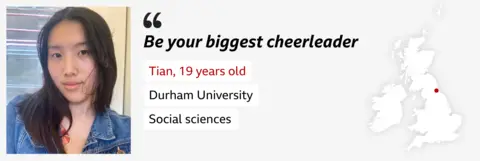
As the first in her family to go to university, Tian Liu didn’t know what to expect before she started her combined honours degree in social sciences.
“I did so much research, but I still felt so unprepared,” Tian says. “University is definitely a roller coaster. There was a point I wanted to drop out, but now I can definitely see the fruits of my labour.”
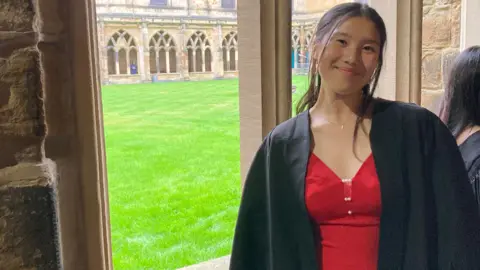 Tian Liu
Tian LiuNow going into her second year, the 19-year-old has found a better balance and would advise incoming students to look after their mental health.
“With tuition fees rising there is such a pressure to make the most out of it, but you can burn out,” Tian says. “University is as much as you make of it, but give yourself grace.
“Have close friends who can act as support and accountability if you are doing too much, and use pastoral teams that the university offers,” she adds.
“There is no need to rush, it’s all a constant learning curve.”
 Tian Liu
Tian LiuOne year on from moving to Durham from Leeds, Tian is in New York completing an internship she got through her university – something she “could never have imagined” last year.
Her advice for incoming students?
“Don’t disqualify yourself from anything. Be your biggest cheerleader. And take so many photos.”
Education
Franklin County Schools considering AI gun detection software
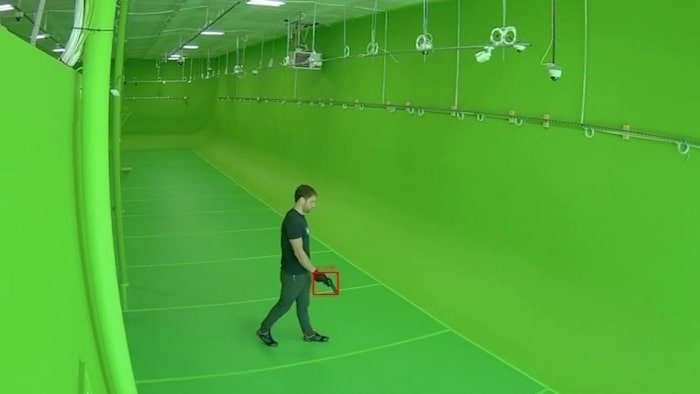
FRANKLIN COUNTY, Va. – School board members are discussing the use of artificial intelligence to detect guns on school grounds.
Superintendent Dr. Kevin Siers said the board has been exploring options, including software from Zero Eyes that uses existing security cameras and AI to identify firearms and alert an incident center within seconds.
“We take safety and security very serious,” Siers said. “So that caused us to take a deeper look into what options are available for weapons detection.”
Dustin Brooks, a co-founder of Zero Eyes, said the system is designed to be proactive and to prompt an immediate response. He described a process in which a camera detects a gun, an operations center verifies the alert, and then dispatches notifications to the school and local authorities.
“From detection — gun brandished in front of camera, camera picks up gun, operation center verifies alert, dispatch alert, customer receives alert — that process can be, you know, as fast as three to five seconds,” Brooks said.
Brooks said human analysts review any images the AI flags, which he said reduces false alarms. He added that the system is narrowly focused on detecting firearms and does not share other images with the information center.
“We’re looking for guns. The only thing that we’re looking for is guns,” he said.
Siers emphasized the move is to prepare for dangerous incidents before they even happen.
“Our resource officers do a great job of trying to study those incidents when they occur and then trying to apply how the lessons learned there might be applied in our schools,” he said. “So it’s just an ongoing process and, unfortunately, it’s something that too many schools are having to deal with.”
If approved, the technology would be implemented at Franklin County Middle School and Franklin County High School.
Roanoke City and Salem Public Schools are among other districts that have used or are considering similar AI detection software.
Copyright 2025 by WSLS 10 – All rights reserved.
Education
AI and the Future of Learning at the Acropolis
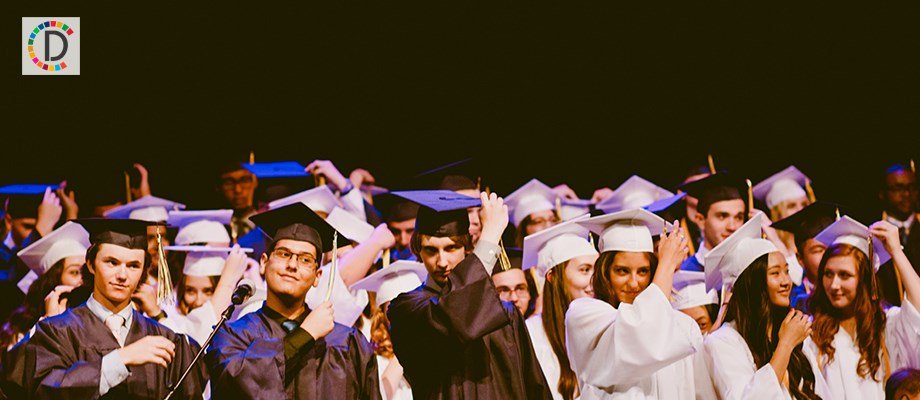
At the foot of the Acropolis in Athens, Demis Hassabis, the CEO of Google’s DeepMind and 2024 Nobel laureate, underscored the imperative skill of learning how to learn in an era dominated by Artificial Intelligence. Addressing attendees at an ancient Roman theatre, Hassabis illuminated the pressing need for adaptability amidst rapid technological evolution.
Hassabis highlighted the future potential of artificial general intelligence, predicting its arrival within a decade. He emphasized the requirement for ‘meta-skills’, such as mastering new disciplines, to complement traditional education in fields like math and science. His remarks reflect the necessity of continual learning to navigate the swiftly changing landscape catalyzed by AI innovations.
Joining the discussion, Greek Prime Minister Kyriakos Mitsotakis warned about the financial inequalities proliferated by burgeoning tech behemoths. He pointed out the potential social unrest stemming from disproportionate wealth generated within a few companies, urging that AI advancements benefit all layers of society.
-

 Business2 weeks ago
Business2 weeks agoThe Guardian view on Trump and the Fed: independence is no substitute for accountability | Editorial
-
Tools & Platforms1 month ago
Building Trust in Military AI Starts with Opening the Black Box – War on the Rocks
-

 Ethics & Policy2 months ago
Ethics & Policy2 months agoSDAIA Supports Saudi Arabia’s Leadership in Shaping Global AI Ethics, Policy, and Research – وكالة الأنباء السعودية
-

 Events & Conferences4 months ago
Events & Conferences4 months agoJourney to 1000 models: Scaling Instagram’s recommendation system
-

 Jobs & Careers2 months ago
Jobs & Careers2 months agoMumbai-based Perplexity Alternative Has 60k+ Users Without Funding
-

 Podcasts & Talks2 months ago
Podcasts & Talks2 months agoHappy 4th of July! 🎆 Made with Veo 3 in Gemini
-

 Education2 months ago
Education2 months agoVEX Robotics launches AI-powered classroom robotics system
-

 Education2 months ago
Education2 months agoMacron says UK and France have duty to tackle illegal migration ‘with humanity, solidarity and firmness’ – UK politics live | Politics
-

 Funding & Business2 months ago
Funding & Business2 months agoKayak and Expedia race to build AI travel agents that turn social posts into itineraries
-

 Podcasts & Talks2 months ago
Podcasts & Talks2 months agoOpenAI 🤝 @teamganassi


